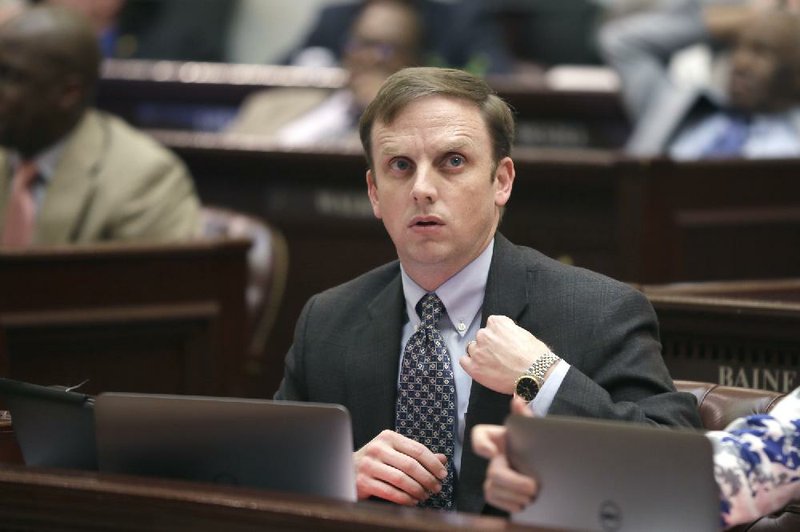Arkansas is not in full compliance with a federal law on sex offender registration and monitoring, state officials said Wednesday.
At a meeting of the Criminal Justice Oversight Task Force, a risk assessment administrator and a psychologist said Arkansas is one of 33 states that fail to meet all of the requirements of the Adam Walsh Child Protection and Safety Act -- federal legislation that became law in 2006. The act aims to create a comprehensive standard in how states keep track of sex offenders.
Brad Cazort, the head of the Arkansas Crime Information Center's sex offender registry, said the Adam Walsh Act has 14 requirements for states to meet to be eligible for some federal grant money.
Presently, Cazort said, Arkansas doesn't meet three of them.
The state's registry does not make public all sex offenders, just those with higher risks of re-offending; it doesn't automatically add to its public website the names of youths found guilty of the most serious sex crimes; and it allows more offenders than federal law does to petition the court to be removed from the registry after 15 years.
To meet all of the federal requirements, Arkansas' laws on sex offenders would have to be amended, officials said.
Sheri Flynn, an administrator with the state's Sex Offender Screening and Risk Assessment program, said recidivism rates for most sex offenders are about the same as for other convicted criminals.
She said that except for the most dangerous sex offenders, such as pedophiles, the recidivism rates range from 6 percent to 10 percent.
Flynn said research shows that low-level sex offenders are more likely to re-offend if they're put under the same heightened scrutiny and monitoring as high-risk offenders.
"Treating them the same as you do higher-risk offenders, there is research showing that we're making them worse," she said.
Flynn said after Wednesday's meeting that listing every sex offender on the public website would mean that people would have to wade through a lot of names to identify those who are potentially dangerous in their neighborhoods.
And Mike Wood, a state prison psychologist, cited a 2008 study from the Justice Policy Institute -- a New York-based nonprofit that researches criminal justice matters -- in saying that the cost of making the state changes to meet the federal standards could be as high as $4.6 million.
But Cazort said he wasn't aware of any additional costs the state would face. He said the Arkansas Crime Information Center already has the tools and information to comply with the federal standards. It's merely a matter of legislators changing the law, he said.
States that do not comply with the Adam Walsh Act automatically lose 10 percent of any grant funding available to law enforcement agencies and courts through a program administered by the Department of Justice.
The Justice Policy Institute's study estimated that Arkansas forfeits about $218,000 in grant money but saves millions by not meeting the federal standards.
House Judiciary Committee Chairman Matt Shepherd, R-El Dorado, said he doubts that making the changes to comply with the standards would be cost-prohibitive.
"I've heard people make the claim it will cost more. I'm not certain. I'm just not sure whether that's going to be the case," said Shepherd, who serves as the task force's co-chairman. "When you're talking about something that Congress passed and federal funds are tied to, it's something we need to look at, and it needs to be considered."
During this year's Arkansas legislative session, Shepherd co-sponsored a bill with Sen. David Sanders, R-Little Rock, that would have allowed the state to meet all of the federal requirements, but Senate Bill 467 died in committee.
Wood and Flynn said some sex-offender cases have extenuating circumstances, and publicly listing the offenders in those cases would lump minor offenders in with more serious offenders, painting them all with the same broad brush.
"Just like anything to do with human nature, it's never simple," Flynn said. "Every case is different."
Wood and Flynn also said youths convicted of sex crimes are unlikely to re-offend, and that it's important to get them treatment and return them to school so they can rejoin society.
If a youth's past was plastered all over the Internet via a sex-offender website, Flynn said, the teen would be stigmatized for the rest of his life.
"There is no one in the world that thinks that's a good idea, in terms of rehabilitation, re-entry, and allowing juveniles to become decent people," Flynn said.
Flynn also said that two of the 17 states currently in compliance with the federal law are considering changing their laws because the federal standards are too onerous.
Shepherd said giving people more information about their safety trumps other worries in regard to the sex offenders.
"I'm more concerned about protecting the public as opposed to some of the other things brought up" in Wednesday's meeting, Shepherd said.
"We take these matters very seriously. We need to ... make decisions that are in the best interest of our state and protecting the citizens of our state."
Metro on 08/13/2015
